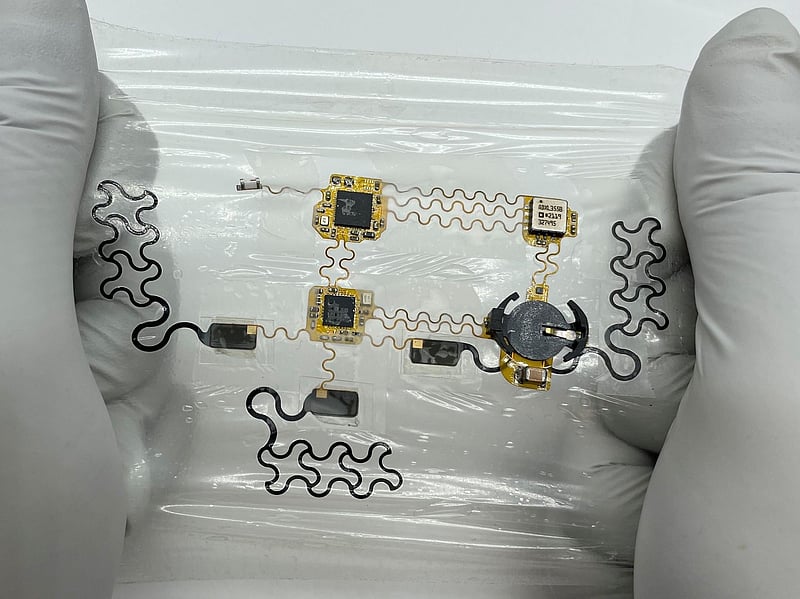Get Healthy!

- Alan Mozes
- Posted May 2, 2023
New 'E-Tattoo' Is Worn on Chest to Track Your Heart Health
Could an electronic chest "tattoo"-- wireless, lightweight and razor-thin -- upend heart monitoring and lower the odds of heart disease for folks who are at high-risk?
Just possibly.
The clear patch in question is not quite 4 by 5 inches in size, weighs less than an ounce, and is powered by a battery no bigger than a penny and just like a temporary tattoo sticker, it's designed to stretch over heart patient's chest. Once in place, it can provide round-the-clock monitoring of two key heart functions: electrical activity and mechanical capacity.
The bio-electronic tattoo, explained study author Nanshu Lu, is basically a "wear-and-forget device."It sits on the skin like medical dressing and can operate for upwards of 40 hours straight before a change of battery.
While current wearable patches only operate as an electrocardiogram (ECG), the new tattoo serves both as an ECG and a seismocardiogram (SCG), added Lu, a professor of aerospace engineering and engineering mechanics at the University of Texas at Austin.
An ECG enables tracking of a heart's electrical status. An SCG provides a running assessment of the heart's mechanical operation by tracking subtle vibrations of the body.
Both ECG and SCG results are streamed wirelessly in real-time via Bluetooth to an external host device that allows third-party monitoring for signs of trouble.
Lu said providing both electrical and mechanical assessments at the same time gives doctors a "more comprehensive understanding of cardiac function than just ECG alone," allowing them to detect and manage various heart conditions more effectively.
She said the tattoo is designed for "high-risk populations,"including patients emerging from heart surgery, or those with coronary heart disease who struggle with reduced blood flow to the heart.
Lu's team has not yet tested the tattoo on heart disease patients.
Instead, researchers conducted a proof-of-concept investigational trial with five healthy men between the ages of 20 and 28. None had a prior history of heart disease.
Tattoo readings were then compared with measurements obtained using current gold-standard methods for assessing both ECG and SCG.
Researchers said the results confirmed that the data generated by the tattoo device was highly "accurate."Those outfitted with the tattoo said the device was exceptionally easy to wear throughout.
Lu and her colleagues plan to team up with the Cleveland Clinic to test the tattoo in a pool of congenital heart disease patients emerging from surgery.
Dr. Gregg Fonarow, director of the Ahmanson-UCLA Cardiomyopathy Center in Los Angeles, reviewed the findings.
"There has been significant interest in developing noninvasive, wireless, battery-powered, reliable, convenient and comfortable cardiac monitoring technology,"to replace much larger conditional monitoring and imaging devices, he noted.
Theoretically, such devices offer advantages, given their "potential to provide long-term cardiac physiologic data in the home environment,"Fonarow said.
But he added, this was just a "small pilot study."
"Further studies will be needed to further evaluate and validate these sensors, and ultimately test to determine if there can be clinical utility," Fonarow said.
The findings were recently published in the journal Advanced Electronic Materials.
More information
There's more about current mobile heart monitoring devices at the Cleveland Clinic.
SOURCE: Nanshu Lu, PhD, professor, aerospace engineering and engineering mechanics, Cockrell School of Engineering, University of Texas at Austin; Gregg Fonarow, M.D., director, Ahmanson-UCLA Cardiomyopathy Center, and co-director, UCLA Preventative Cardiology Program, and co-chief, UCLA Division of Cardiology, Los Angeles; Advanced Electronic Materials, April 18, 2023
